Text
(I'm not a professional!) Hey, if you wanna read more about bilateral tapping, search up EMDR. It was invented specifically to cope with feelings of PTSD in both soldiers and children but can also be used for general anxiety and trauma responses.
The general movement is enough if you're alone (it literally replicates the comfort of a hug), but it can also be done through guided sessions with therapists. Generally from what I've learned/experienced, slow tapping = for recalling happy/comforting feelings, fast tapping = for recalling intense/negative/potentially traumatic events/feelings.
Again, NOT a professional! Do your research and happy healing <3
Gettin' Through the Holidays Mental Health Tricks
If y'all are anything like me, this time of year is triggering AF. Here are some small, very easy grounding exercises that I was taught by my therapist, basically in order of how much I like them for this rage-inducing season. You make like them in a different order, depending on your rage-to-despair ratio.
Push a wall: literally go up to a wall and try to push it over. Really try. I promise you won't push it over, but give it your best shot. Try to hold it as long as you can, and then take a breather and assess whether you need to repeat. Why it works: This is a quick, physical expulsion of the fight-or-flight feeling. It's a bit like punching a wall, but without the potential to hurt yourself/look scary/damage things. You can even do it in front of people and say you're stretching, they'll never know (unless the wall actually falls down, but this will not happen, I assure you).
Shake like a dog: Animals shake to release stress, and you are also an animal. Setting aside time to just shake it out, as vigorously as you can, arms and legs, face, stick your tongue out, pretend you're shaking like a wet dog. You can dance instead, if that feels better, and you can do this to music, but basically the more unhinged you can be, the better. If you are in a place you can scream, scream too! Why it works: like the above, this is a release of pent-up stress and anxiety. Especially if your rage-to-woe ratio is high, some kind of physical exertion is often the best way to burn through the cortisol and adrenaline you're building up.
Bilateral Tapping: Cross your arms over your chest so that your fingertips are at your shoulders, and slowly tap, one hand at a time, back and forth, for about a minute. Breathe slowly. Why it works: This is weird as hell, but because this engages both sides of your brain, it helps override the activity of the amygdala, which is the part of your brain that Makes The Fear. If you're being literally triggered in a situation, i.e. you're having a trauma response, or reliving some family trauma, this is a good one.
Box Breathing: From a comfortable position (can really be seated, laying down or standing), inhale slowly for a count of 4, hold for a count of 4, exhale for a count of 4, hold for a count of 4, then repeat. You can do it for shorter counts or longer counts, but if you vary the counts make sure the exhale is longer than the inhale. You can close your eyes or leave them open. Why it works: This exercise helps you move from a sympathetic (activated) nervous system response to a parasympathetic (balanced) response. I do this one every day, and it's a good gateway to meditation. Especially helpful in anxious or tense situations, but I find if I'm very triggered I need one of the other ones first, or it can make anxiety worse. Breathwork is amazing but not usually as a first exercise if you're very activated, or have been activated a long time.
Ice: Lots of ways to do this one – hands in cold water for 30 seconds, ice pack on the back of your neck, dip your entire face into a bowl of ice water (this one's the most effective). Why it works: I kinda think this is hilarious, but this activates your mammalian dive reflex. It immediately slows your heart-rate, so if you are feeling your blood pressure and heart rate rising, this one is very good. The only reason this one's at the bottom of my list is because I hate being cold.
I wish you all a very get-through-the-holidays-without-hurting-yourself. Take time alone if you need it.
16K notes
·
View notes
Text
This is so important. You're here to have fun, not to excel
i'm not the best at singing. but i'm gonna sing anyway dude. i'm not the best at painting. but i'm still going to paint. my dancing will never see a stage. but it's perfect for early mornings in my bedroom and late nights with people i love. so what does this mean? it means that people are designed to do. not to be the best. just to do. if you're doing what you enjoy, then you don't have to be the best. you just have to enjoy it. you have to live.
10K notes
·
View notes
Text
all your stuffed animals love you. they're not sad if they're in a box, or on the floor, or not held/played with as much. they understand. they know that you might need another stuffie more, or that you don't have enough space. they're just happy to be with you, and if you ever give them away, they'll be happy there too. stuffies are for comfort. they understand. they love you too. it's okay.
86K notes
·
View notes
Text
What Writing is For
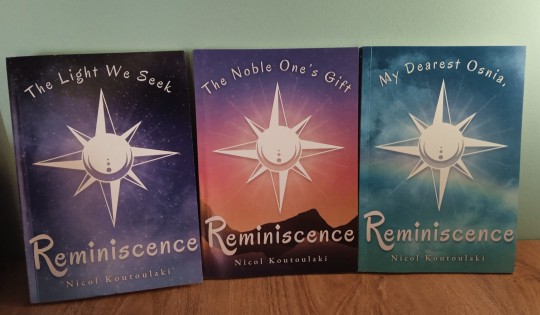
A few days ago, I printed my books. It wasn't to publish them or anything like that. Many will say that it's foolish to do so since, if published traditionally, they will change quite a bit through all the rounds of editing (although I do hope most things stay the same if publishing ever happens). Anyway, I've been working on these books for years now. I wrote them, edited them, designed maps and calendars and covers and little details on the pages. I look at them in my hands and go "they may not be perfect, but they're mine." And that's enough.
Yesterday, I gave one set of copies to an old teacher of mine. I hadn't seen them in years, because I always told myself I'd visit them again once the books were "ready". They supported my writing from the very start; even when it was still a preteen's first attempt at writing a novel. They are one of the biggest reasons I kept writing and finished these books. After many years of writing, failing to get anyone in my life to genuinely give them a thorough read, and trying to stay afloat in the endless ocean that is the publishing process... I burst into tears when I saw them again. They gave me the tightest hug and told me they missed me. I missed them so much as well, but I was so overwhelmed it seemed impossible to put my gratefulness into words.
The fact that I made myself proud, that I held my books in my hands and I got to give them to the person that motivated me to finish them is something I think many of us forget:
It's okay if your work only ever reaches one person; and it's okay if that person is you.
Maybe I'll make a post or even a YT video about these books for the heck of it if anyone is interested and if I ever gather the confidence to show my face (the fear of being seen + digital footprint = :( ).
For now, here are some photos of the designs on the inner pages. I created all of them myself, and though it took a lot of years and exhaustion, I had fun; and that's all that really matters.
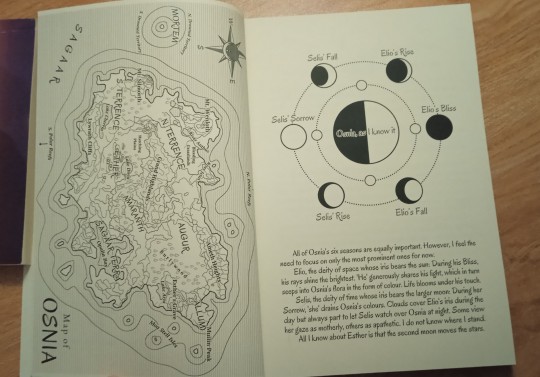
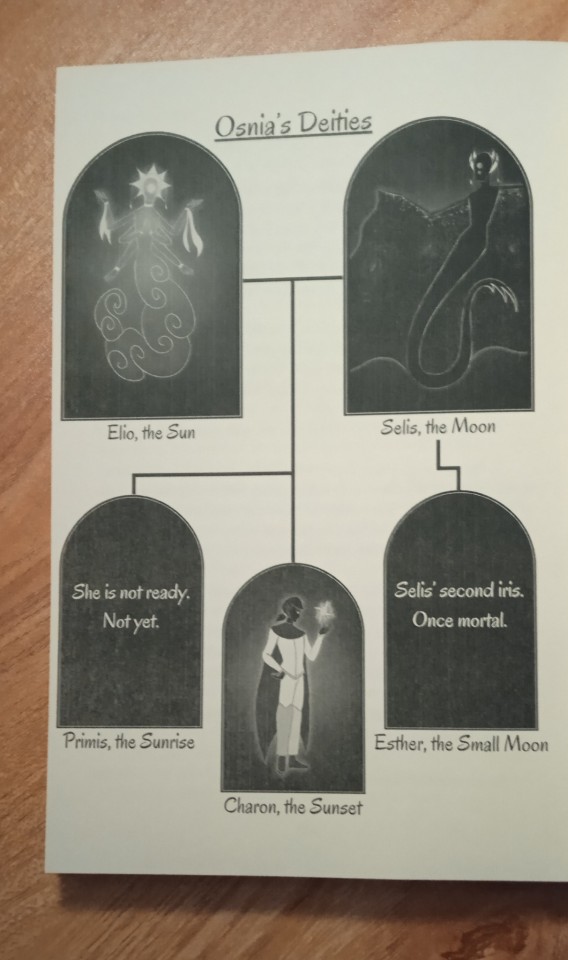

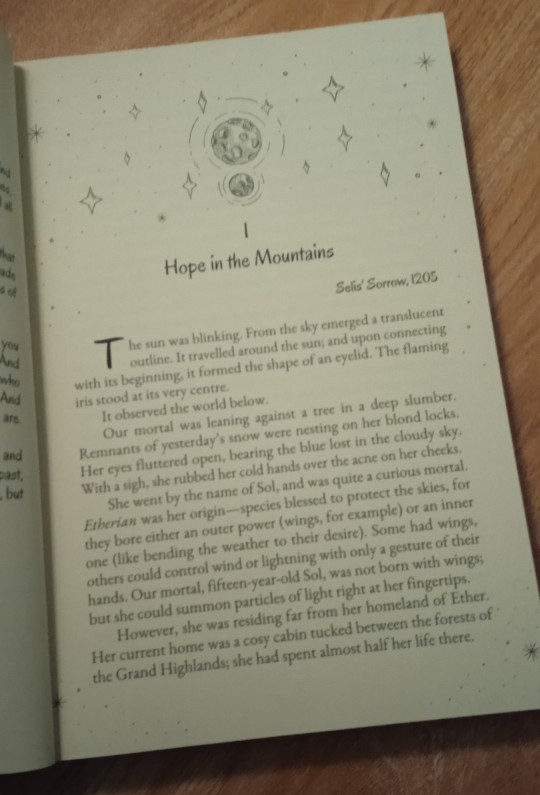

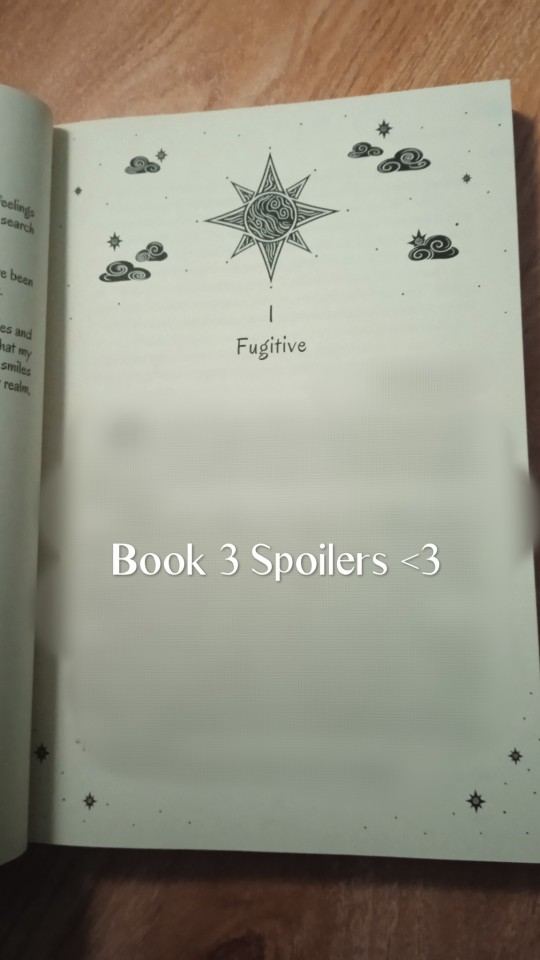
Toodles <3
3 notes
·
View notes
Text
You Create for Yourself
After nearly 6 years of writing my book series during hard times, it's safe to say it's become quite a comfort thing for me. I know most artists are quite attached to their works, so much so that we tend to forget that criticism towards it is not criticism towards us.
I've never shared my work with anyone before, and hearing some people's negative opinions on it for the first time was quite disheartening to me. On the other hand, I've had friends (who have read more of it) say that they really liked it.
Still, both sides are irrelevant when it comes to your feelings about your work. Of course it's alright to listen to (constructive) criticism, but nobody knows your book better than you. Nobody can judge your entire book based on one excerpt, one page, or one paragraph.
When you want to actually publish your book, it's scary to think (or realise) that it's just not what sells or what traditionally attracts people to read. But you know, you wrote that story for yourself first and foremost. It's alright if one person likes it, and even moreso if that person is you.
Basically, what matters is that your book / work of art appeals to you. That doesn't erase the fact that someday, someone might like it. But you have to learn to like it without the approval of other people.
Like with every writer, I imagine my books getting popular, gaining a fanbase, commenting on fanart and fanfics and theories about my works. On the other hand, sometimes I wonder if people will ever enjoy them; if I'm better off just printing them for myself and keeping them in my bookshelf as an heirloom that will probably never be read by anyone other than me. These books do give me a lot of comfort, after all, and learning that they're generally disliked would crush me.
But y'know, you've gotta keep on trying. You'll find the right audience someday—even if it's not through a publisher or social media or anything like that. You don't have to be the next Tolkien or Stephen King to be considered successful. And even if you never become 'successful', so what? You've written a book (or more!). That's more than most people—heck, most writers—have accomplished.
Anyway, vent post over. Sorry if this was all over the place, but I hope I got the message across. Be proud of what you've created, even if it's only your cup of tea <3.
8 notes
·
View notes
Text
Make Art!!
Start singing!! Start dancing!! Start writing!! Start drawing!! Who the fuck cares if you're not good at it!! That's what life is all about!
2 notes
·
View notes
Text
Dream Home Addition
The sensory room. It is located somewhere that cannot be noticed/accessed easily (under a staircase, inside a closet, in a secret passage). It is filled with lots of stress balls, weighted blankets, and pillows. The lighting is extremely dim (if not non-existent) and you can either play relaxing music or simply sit in silence. Every outside noise is drowned out.
Oh, and aromatic candles. Lots of them :)
0 notes
Text
A painting I created

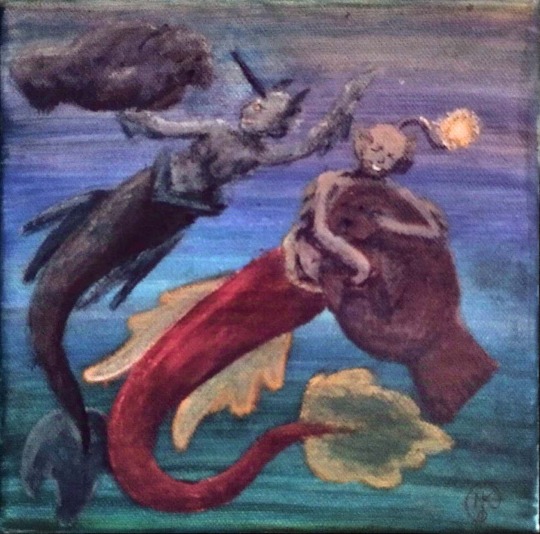
I've always been too afraid to properly practice with paint—I have fears of messing up, wasting supplies, etc. But honestly, when I need an escape from my more 'official' projects, I like to try and experiment a little without the pressure of it being 'perfect'.
I called this one "Mermaids Playing with Sea Mammals" because it is rumoured that the myth of the mermaid started because sailors would confuse sea mammals in the water (like manatees) with human women because of their similarities in some organs such as the vagina. So I thought mermaids playing with sea mammals to thank them for fooling sailors was a cute idea :).
Also don't ask, I just like drawing mermaids this way because it's the way I depict merfolk in my fantasy books. I like basing the fish part off of different sea creatures (anglerfish and narwhal in this case)!
Anyway, this was my little ted talk. It may not be perfect or even good, but I'm proud of it for a first attempt (also camera quality bad lol).
Toodles :)
3 notes
·
View notes
Text
Writing & Perfection
This is going to start off as a bit of a personal experience, but we'll get to a generalised conclusion! :)
I'm close to printing my books (not publishing, for personal reasons) and I now have this feeling of dread because I know that I'll struggle with reading them once they're printed.
Every time I read my books, I think to myself "oh, I could've written this like that" or "hmm maybe I could have added this story beat/character arc"; and heavens forbid I spot a typo after reading/correcting each book a million times over the years.
At some point though, I have to forgive myself.
My books are pretty short for their genre and a bit different in the sense that they include things outside the main plot that give you additional information about the general world and story (secret narrator, family tree, maps, calendars, letters, etc) so they'll be quite hard to query for if I go with tradpub (and also the fact that querying a completed trilogy is already quite difficult!).
Always hold hope, of course, but at some point I have to realise that these books were written for myself first and foremost; not for any hypothetical agent, publisher, or fan. So why should I beat myself up over a simple error (that may not even be there in the end)? For many authors (including myself) our books are our 'comfort'; so why should I not enjoy the completion of my 'comfort' story? I want to be able to hold my books in my hands, lie down in bed and read them over and over during a cosy night.
Here are some of my favourite quotes regarding this that may motivate you:
- Perfect is the enemy of good.
- Anyone who has never made a mistake has never tried anything new.
- To err is human.
So yeah folks, it's alright to make mistakes. Shocker! It's something that seems so obvious, yet something few people realise. I certainly have a long way to go till I get rid of that perfectionism mindset. But I'll keep trying, because trying is better than doing nothing.
Toodles <3
8 notes
·
View notes
Text
Writing Makes You Sneaky (Foreshadowing)
I don't know if this is a shared experience but whenever I wanted to foreshadow something in my books I almost always had to be extra sneaky and cunning because to be honest, it's much harder to hide something in a book than a movie or a show. And that's simply because in a book, the reader only sees what you tell them. You are your readers' gateway into the story.
And you may say "well yeah, but a camera works much the same way in a movie, no?" but I don't think they count as the same thing. In a book, it's easier than ever for the reader to reread a line over and over. Same thing could be argued about rewinding a movie, but still. Take this example:
I want to hide an object in the background of a scene. In visual media, I can just place the object there without ever pointing it out and let the viewer zoom in and notice it themselves.
In a book, I have to explicitly describe the object, otherwise the reader can't possibly know it's there. The best tactic I've found is to describe the object casually, without much detail, in the middle of the room's general description so it blends in with its surroundings.
My books have quite a lot of puzzle pieces and foreshadowing you can put together (they are high fantasy, so they've got some lore), and planning out how to express them to the reader in a discreet yet intriguing way was super fun. Definitely one of my favourite experiences writing those books.
Anyway, just wanted to yap about this small thing. :)
Toodles!
20 notes
·
View notes
Text
Friendly Writing Reminder
Always take these grammar/text checker programs (especially the AI ones) with a grain of salt, since most of these programs were made to correct text like essays, articles, etc and not fiction writing. It's natural for an author to occasionally use the passive voice or change up the syntax and structure of a sentence for stylistic/literary purposes. Same goes with punctuation, of course an author is going to have richer and more 'emotional' punctuation than a formal research paper.
Every author should know proper grammar, syntax, etc of course, and these programs do help sometimes! Just don't depend on them too much and try to find your writing style (without your writing turning incomprehensible of course).
Learn the rules, then figure out how to break them (while still having a readable story)!
#writing#writing advice#writing tips#literature#books#writeblr#creative writing#writer struggles#friendly reminder
3 notes
·
View notes
Text
Most Underrated Writing Tip
So in the past I've talked about how falling down a rabbithole of writing advice (especially online) can lead you to refrain from actually writing because you feel the need to be 'fully' prepared (which is impossible, since advice on the internet is infinite and everyone has their two cents). In the end, we came to the conclusion that practice is the best medicine and that you should go create art without the fear of it being 'imperfect' or 'flawed'. Check out the full post about the Writing/Art Advice Rabbithole to read more about it.
So now it may seem hypocritical of me to suddenly come here with writing advice, but it's something quite important that I didn't mention in my original post. And this time, I also have an example based on my own writings and how this 'tip' helped me.
So my advice is this: Read more books.
Pretty anticlimactic, right? It's something so obvious, and something that's been definitely said before. And yet, between the popular 'show don't tell's and 'said' alternatives, it's pretty rare to come across.
I'm going to use my own books/writing as example because A) it's easier and B) you never stop learning and improving. My writing isn't perfect either of course.
My book series is YA High Fantasy™, and I finished writing/editing the main trilogy some time ago. Now that I'm in the final stages before going "yes, it's ready for me to find a way to publish it", I've been fixing some things in the beginning chapters of the books. Since the series is High Fantasy™ and has quite a bit to digest when it comes to the world, its lore/mythology, species, etc, I've been trying to make it as easy as possible for the reader to have the basic knowledge without me being confusing or too direct.
As a victim of the 'Show, Don't Tell' extremism, I went through quite a bit of my writing journey thinking of SDT as the eleventh commandment. That did not help me in the long run, because no one was there to tell me that "hey, sometimes telling is necessary!". It was only when I read The Hobbit for the first time this summer that I realised that telling is sometimes 'required', especially when you have a complex High Fantasy™ world and you need to get the basics across to the reader. If I had never started reading it (and generally other books in my genre, since by then I had only been reading classics of completely different genres), I would've never thought to change up the first few chapters to make the world more clear to the reader. And if the reader were to get confused from the first chapter, it would've been a disaster.
Same thing about the editing process. Reading books from both self-published authors and traditional publishers has made me realise that just about every book you meet will have one mistake in it; whether it be a typo, a margin, an extra space, etc. This fact made me worry so much less about my own books. Of course I've read through them a thousand times and made sure there are no mistakes; but if there is, then that's okay! It happens. To err is human.
So yes, read more books, and not just for enjoyment. Try to find what you like about an author's style and find how and why they do it (it'll also expand your vocabulary!).
Toodles <3
19 notes
·
View notes
Text
The Glorification of Self-Deprecation in Art/Writing Spaces
Heads up, I also still self-deprecate from time to time, and I think it's perfectly fine to be humourous about yourself!
Most microtrends (usually with audios for short-form content or memes) in the writing and art community tend to always have a really... self-deprecating character to them? Again, it's of course alright to acknowledge your weaknesses in a funny way sometimes, but I think that social media's nature usually encourages people to be self-deprecating for laughs because people can more easily relate to flaws than strengths. Self-deprecation gets more engagement because negative content gets more engagement.
Sometimes, it's so people can feel better about themselves and see that every writer/artist has their flaws (which is good!). But when you start to identify with your self-deprecating thoughts so much that they become 'quirky flaws' that your mind is unwilling to change, it becomes a problem.
A big one I always see in the writing community is in regards to procrastination; rarely ever making progress on your work, doing everything but writing, etc. Now two notes here: of course procrastination can stem from things such as neurodivergence, and that's an exception! Procrastination isn't laziness. I myself have struggled with it in the past (and still do sometimes). But what I've personally learned is that scrolling through procrastination-related and self-deprecating memes on social media helped me much less than actually trying to fight my procrastination.
I'm not saying it's something easy (again, especially when it comes to procrastination that relates to neurodivergence), obviously you can't just tell your brain to stop procrastinating. Self-deprecation may ease the problem in the moment, but if it becomes a constant thing, I think it's more likely to turn into an obstacle for your journey rather than a boost.
It's alright to make memes/posts/thoughts that showcase how proud you are of your work! No matter your skill level, there is always something to admire. At least once in your life you'll have a moment where you're proud of what you've created. Cling onto what you think you did right and be proud of yourself for it!
For example, in the first drafts of my books (and even now to a lesser extent) I found myself holding back while writing. I feared adding 'flavour' to the narration because I believed I always had to have the serious formal style of more classic authors. I did make jokes about that to myself a lot, but I never really worked on improving because of it. I kept it as my 'quirky writing flaw' even though it bothered me a lot. It was only when I finally decided to get out of my comfort zone and improve that I felt better about my skills. I may not be fully there yet, but I have improved a lot in that aspect; and I am proud of it.
So next time while writing (or creating art), instead of always thinking to yourself "haha i'm so bad at writing kiss scenes" think "damn am I good at writing character descriptions". And also the classic "what's the issue here? How can I improve?" etc etc.
Happy writing/creating art. Hope this encouraged you, even slightly!
Toodles <3
#writing#books#art#comfort#writing advice#writing community#writeblr#creative writing#literature#self deprecation#this has been a psa
12 notes
·
View notes
Text
My fantasy books aren't really the classic DnD - LotR story structure but this song just hits different after you've finished writing your book. I love feeling like I myself have gone on a journey with my characters. This song feels like a perfect epilogue to all your efforts while reading/writing. It's victorious yet bittersweet.
0 notes
Text
Some (Free) Writing Resources I Use
I've noticed that half the writing resources I see recommended are usually pretty limited without paying, so allow me to list off some of the completely free ones I've used throughout the years:
Azgaar's Fantasy Map Generator
Literally amazing for creating maps, it's so detailed and has a wide variety of options. I made the map for my book using it by modifying one of its randomly-generated templates. You definitely don't have to be an artist to use it but I did personally add little details to mine via hand later. Nevertheless, highly recommend.
Scribus
If you're formatting your own book, Scribus is basically the free version of Adobe InDesign. It has a bit more of a learning curve and doesn't have all of InDesign's capabilities, but it's just perfect for book formatting. I formatted three whole books on it by myself and they came out great. You've just gotta have a bit of patience until you get used to it.
Fantasy Name Generators
Ok yeah, this seems obvious since it's a very well-known website. I often use it as inspiration without directly taking names from it (since the names I put into my books almost always bear some sort of meaning), but then I looked at the sheer number of categories and HOLY MOLY. It may be called Fantasy Name Generators but you'll find names for everything there.
PureWriter
Well, this is awkward, because this writing program actually has a premium version so it's not completely free... Should I feel like a hypocrite? Maybe, but I think the free version is more than enough for most writers. It's on mobile and PC; mind you, I've only ever used the mobile version, but I'm really satisfied with it. Even without Premium there are no ads, the formatting options are a delight, and it's just really handy for writing on the go (because Google Docs and Word are atrocious for writing on mobile, fight me on this). Anyway, very neat program.
WordHippo
By far my favourite online dictionary (aside from the more 'professional' ones like Cambridge) because it provides you with quite a lot of options: from synonyms and antonyms to words that rhyme with the word you've put in! As someone whose books include some lore-important poetry here and there, it's been a real lifesaver whenever I find myself stuck.
HeightComparison
So... this may seem weird. It's a really small detail, but since I am also an artist who depicts her characters, I think that knowing your characters' heights (especially in comparison to one another) can really help with writing all kinds of interractions. Like the classic "someone stands on their tiptoes for a kiss" or "this person has to duck when passing through a doorway". I used it to measure my characters' sizes compared to a building and then used that information to determine the size of another being that appears in the books. Pretty fun stuff.
Anyway, that's all. Speaking of free resources, I recently discovered Carrd and it's pretty neat for making a simple site to display your books. Check it out! :)
Toodles <3
23 notes
·
View notes
Text
Reclaiming the Web & GenZ Comfort
I love witnessing the recent wave of people (mainly Millenials and especially Gen Z) rejecting social media and trying to recreate the more 'Personal' Web of the early days of the internet. I am Gen Z myself, and though I had social media for the purpose of promoting my books and keeping in touch with people, I seldom use them now because I am so enamoured by the idea of the Personal Web. Deleting social media apps has been tremendously helpful to my mental and even physical health; it just feels great.
The Personal Web movement mainly relies on creating your own website (with Neocities, for example), forums, blogs, etc. I am planning on learning HTML & CSS, so hopefully in the future I'll be able to join the club, but for now I think Tumblr is a good platform for simple blogging like this. Sure, it has social media aspects, but that disconnect it has from celebrity culture and short-form content really makes it a good start (not sponsored, haha).
So yeah, let's reclaim the internet and push away celebrity/corporate culture and AI brainrot. This movement makes me hopeful for the future generation. I can only speak of Gen Z, but I think a decent amount of people have realised/lived the consequences of the internet from a young age, also referred to as 'internet trauma' by many. So here's hoping we reinvent the internet to make it more human again (and protect children from it, especially at its current brainrot state). I believe in us.
9 notes
·
View notes
Text
The 'Fame Deadline' in Art
You know, I think all this exposure we have to successful artists/writers (usually young, or at least younger than us) makes us forget the simple joy of creating something for ourselves, or even for a small community of people. It's okay if your art is only known in your town or local area. It's also okay if you make art for yourself without the intention of sharing it; or, if you do want to share it and it isn't successful, it's alright if you are the only one who enjoys it. Because, ultimately, you are creating art that *you* want to enjoy (or you and a handful of loved ones/locals!).
Fame is not limited to the two ends of 'unknown artist' and 'household name'. There are plenty of in-betweens that leave people perfectly content. Some people become 'famous' in their 20s, others in their 60s, while most people never achieve 'fame' in their lifetimes. Still, there's no 'fame deadline', especially for artists and writers. Creativity and artistic expression doesn't have an expiration date.
Point is, it's alright if an art piece only has one admirer; and it's fine if that one admirer is the artist themselves.
2 notes
·
View notes